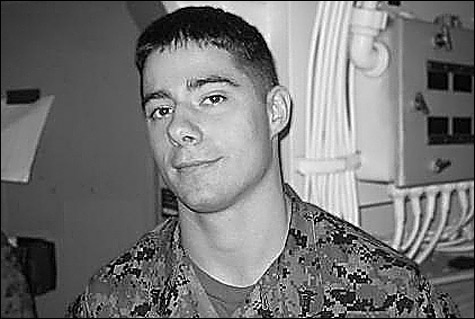
Liam Madden
|
Each summer, it seems, the Iraq War springs another issue for the peace movement to rally around, symbolized by a specific face with a story to tell. In 2005, it was Cindy Sheehan’s loss and her dogged insistence that Bush explain why we invaded Iraq, where she lost her 24-year-old son. In 2006, it was Lieutenant Ehren Watada’s refusal to deploy. This summer, the latest phase of the movement may be epitomized by two more faces: Marine Corporal Adam Kokesh and Marine Sergeant and Boston-chapter president of Iraq Veterans Against the War (IVAW) Liam Madden, both of whom were honorably discharged from the Individual Ready Reserve (IRR), a group of unpaid reservists that can be, but rarely are, called up. The pair learned this past week that the Marine Corps was recommending they receive “other than honorable” discharges as a result of certain aspects of their anti-war activities.
Kokesh’s troubles began after he received an e-mail from an officer that said he was being investigated for wearing a uniform to a “mock combat patrol” earlier this year. The IVAW member responded by saying, among other things, “go fuck yourself.” For that remark, as well as for the clothing infraction, the corps informed Kokesh — who, along with Madden, has been defended by the Veterans of Foreign Wars — that he would be prosecuted. But not before offering him a plea bargain.
Not one to be intimidated, Kokesh turned down the plea and chose instead to travel to Kansas City to appear before a military tribunal on Monday. The board’s official recommendation was that Kokesh receive a general discharge, which is a step below an honorable discharge and allows him to hang on to his benefits. Kokesh says he might appeal the judgment.
Madden, a Boston resident attending Northeastern in September, told the Phoenix that his charges, like Kokesh’s, are two-fold. The first is for wearing a standard-issue camouflage utility top to a protest. The second is for “disloyal statements” the Corps claim he made during a speech in February, when he was not in uniform. “I said that the president has betrayed us service members, that the war in Iraq is a war crime, and that the war in Iraq is a war of aggression,” says Madden. As of yet, no hearing has been scheduled for him.
Madden, co-founder of the Appeal for Redress — a petition signed by almost 2000 active-duty military personnel urging Congress to cut the war’s funding — says that if he were to lose his honorable discharge, he’d have “a black mark on his record” that would make it difficult to “get all sorts of employment, particularly government employment.” Far more serious, though, are the broader effects these rulings could have on members of the IRR: namely, that it could keep other vets from speaking out for fear of becoming subjected to investigation. The danger is, as Madden puts it, “if you’re trying to silence veterans, then you’re impeding a society that would otherwise be informed and be free.”
Do the corps have grounds to do this? Kathleen Duignan, executive director of the National Institute of Military Justice, confirms there’s a regulation that states military personnel, active or inactive, aren’t to wear any sort of uniform to a public protest. But, she adds, it’s “highly unusual to pursue someone with civilian status for speeches they made in their free time.” Says Duignan: “Can they do it? Yeah. Is it in anybody’s best interest? No.”
On the Web
Adam Kokesh's blog: //kokesh.blogspot.com
Appeal for Redress: //appealforredress.org